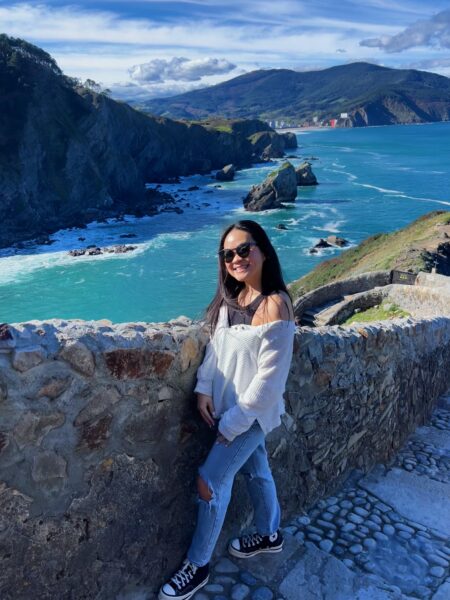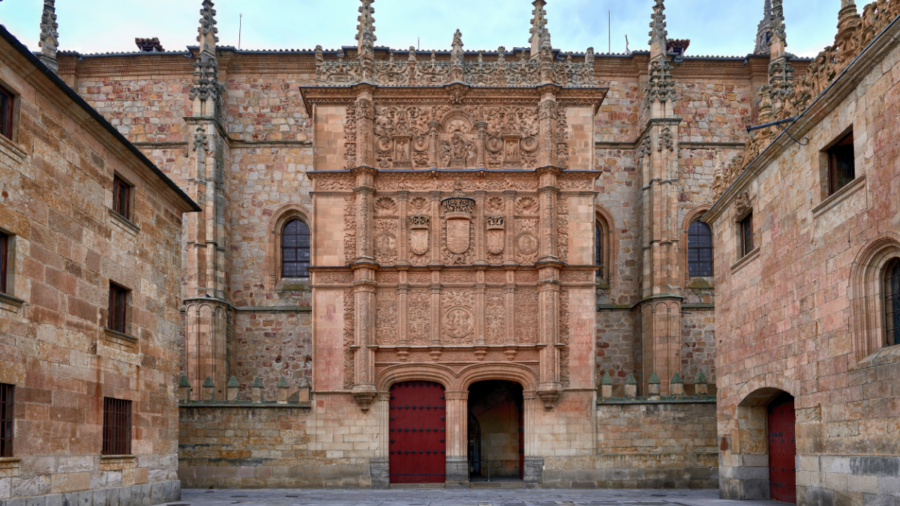Eager to step into the footsteps of a college student who is experiencing life in Spain? We recently caught up with AIFS Abroad student Peyton from the University of Northern Colorado who is spending her spring semester studying abroad in Salamanca at the University of Salamanca. She is an Anthropology major and received the Russel R. Taylor Foundation Scholarship.
Read on to learn more about her study abroad experience in Salamanca with AIFS Abroad and what it’s like to be an international student at one of the world’s oldest universities.

Academic Excellence
Here at AIFS Abroad, we offer numerous program options in six different Spanish cities. So why did Peyton choose to spend her spring semester studying in Salamanca?
“When I was searching for locations I wanted to study in, I knew I wanted to go somewhere where Spanish was commonly spoken. I come from a town with a big Latinx community, and my minor is Spanish, so I chose to come to Spain. I am studying at the University of Salamanca and have enjoyed every minute. Salamanca is a smaller, calmer town and not many people know English, but hey, the best way to learn is to fully immerse yourself, right?”
Transitioning into a new academic setting can bring on a mix of emotions! While you’re used to life as a college student on your home university’s campus being a certain way, life as a student abroad isn’t going to be an exact replica of that experience. You may even have a first-day-of-school feeling that combines nerves and excitement, which is totally normal! Peyton describes acclimating to life as a student at the University of Salamanca:
“Now that I’m in college, first days aren’t that big of a deal, but my first day at this university took me back to when it was my first day at high school—what will people think? Will I fit in? Would people laugh at my Spanish? What if I don’t make friends? Although I chose for all my classes to be in Spanish and put myself in an uncomfortable position, I couldn’t help but let the nerves and thoughts creep in. Most of my peers are from The United States but there are a good number of students from Taiwan. As I met more of my classmates, I came to the realization that everyone is here to learn and experience the culture. Everyone is at a different skill level and some, if not most, knew more than me, but it just made making friends that much easier. At school, I would sit next to students who I knew could help me if I had any confusion with the material and as my peers would raise their hands and ask questions, it encouraged me to ask any questions I had. The teachers here are so helpful and understanding, they know we’re all learning and very patient and gracious when we participate, they’re just grateful we are trying and learning. Mistakes are inevitable but it’s how we learn from them that sprout growth.”
Peyton dedicated herself to excelling in this new environment, proactively adjusting her learning strategies to be more aligned with the teaching style and academic culture in Salamanca.
“To this day, my Spanish literature class is the one that challenges me most. Granted, all of my classes pose some type of difficulty, but when I got done with my classes for the day, I would go home and review anything I didn’t understand. I looked up words, looked over presentations, even asked peers about content. Then, I would try and look over presentations for the next class so I could get an idea of what lectures were about. Eventually, I started grasping each professor’s teaching style, more and more words became familiar, and little by little I was learning in Spanish. I am far from fluent, but I am far from where I started.”

Career Readiness
But what about applying your theoretical understanding of your coursework to your literal experience abroad? Peyton breaks down how her Anthropology major and its concept of cultural relativism — learning and understanding a culture without judgement — has impacted how she puts her academic knowledge into practice.
“When first arriving to Spain, I was aware of some of the different lifestyle norms and some I wasn’t, but actually living my day-to-day life in such a different environment taught me a different type of patience; to give myself grace and patience for not knowing and giving grace and patience to others, reminding myself this is their life in their home and I am the visitor.”
This, in turn, will impact the way she approaches her post-graduate experiences and the goals she’s set for her future career.
“After I graduate, I am going to graduate school for public health and I plan for my capstone project to include traveling to Peru and collaborating with a nonprofit, addressing medical issues among silenced villagers, with a particular focus on women’s pre-and post-natal care. While I attain my degree, I want to volunteer at the International Rescue Committee, supporting immigrants, asylum seekers, refugees, victims, and survivors in their journey to thrive in the United States.
Shortly after, I will apply to the Peace Corps where I strive to gain a firsthand understanding of global health challenges. Although the specifics of my post-Peace Corps path remain uncertain, I am hopeful that the experiences gained will open doors to opportunities where I can make a meaningful influence on health disparities, marginalization, and discrimination. While on my journey, it is crucial I acknowledge my position in all of this, the outsider who is coming to listen to understand and not necessarily to respond.”

Diversity, Equity, and Inclusion
As a student studying abroad, you’re immersed into a culture that is unlike your own. It allows you the opportunity to reflect differently on the diversity that exists within our world and gives you a new perspective on what it means to be included in an environment when you aren’t natively part of the local community. Peyton’s spring semester with AIFS Abroad in Salamanca allowed her to view diversity, equity, and inclusion through a new lens.
“My time in Europe has really exposed me to the importance and vitality of diversity and equity. Most people travel to experience new and different cultures. I couldn’t imagine a world where we were all the same. We should appreciate diversity and be grateful when a community includes and welcomes outsiders to share their culture with. Without diversity and inclusivity, I probably wouldn’t be studying abroad and traveling the world. I wouldn’t be able to appreciate the uniqueness of each place.
As humans, it is a part of our nature to communicate and socialize, we learn, and we adapt. It is important we protect and preserve diversity, equity, and inclusion in all settings, so we achieve a common goal of making the world a better, kinder, safe place.”
Final Thoughts
And so, as she embraces the journey, she invites others to take the leap, as well.
“Studying abroad has been one of my greatest decisions and I encourage you to step out of your comfort zone, explore, and travel. Add some more chapters to your story, the world awaits!”
Are you a student who’s ready to take the leap and study abroad in Salamanca like Peyton did with AIFS Abroad? We’d love to help you start your journey!
Here at AIFS Abroad, we know a thing or two about helping college students and pre-professionals study and intern abroad. Our programs are incredibly inclusive, which takes a lot of the stress out of planning. From coordinating your housing to providing things like cultural and social activities, excursions, comprehensive insurance, 24/7 emergency support, on-site staff, and more, you’ll take comfort in knowing you’ll have support throughout your entire experience abroad.
